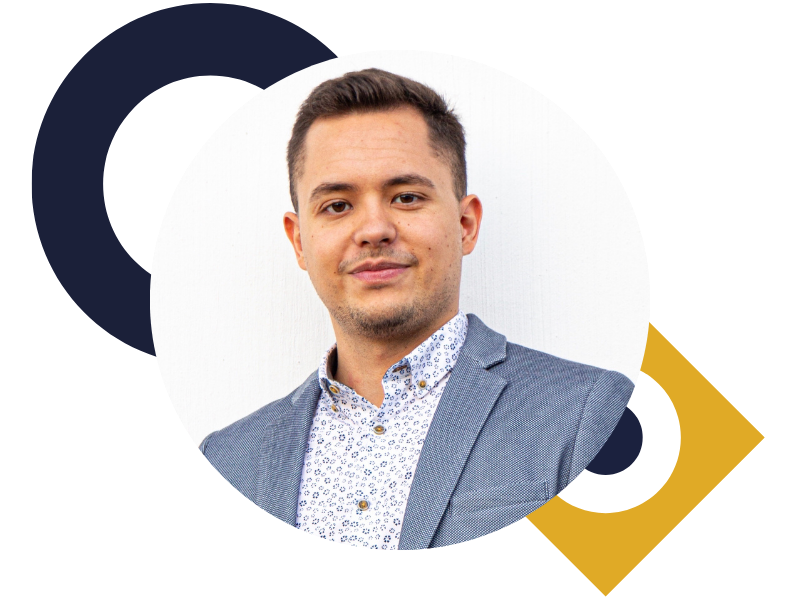“I have always been somewhere between practical and academic life ” – Krisztofer Szabó’s PhD story

Krisztofer was born in Debrecen and started his higher education in Győr, Hungary, with a bachelor study programme in Commerce and Marketing. He has always liked to be in new environments, looking for variety in his life. This is how he ended up at the Corvinus University’s Master programme in Business Development. The new environment here immediately appealed to him. He joined the Business Development Club, a student association in which he has held several executive positions and participated in interesting projects. After obtaining his Master degree, he started his doctoral studies. During his PhD studies, he joined the CUB Centre of Family Business, where he received a research grant, and was further motivated by his participation in the grant schemes of the New National Excellence Programme, ÚNKP.
Early successes, victory at the National Conference of Students’ Scientific Associations
He started to take an interest in scientific work during his bachelor programme, and his paper at the National Conference of Students’ Scientific Associations was awarded first place. The topic of his research was their family business, as he was investigating “whether antiques can be called brands”. Thanks to his outstanding achievements, he subsequently participated in conferences both in Hungary and abroad. He had previously conducted research on urban marketing and has been successful in case competitions. In his doctoral dissertation, he also has a penchant for focusing on practical aspects.
Experiences abroad
Although he was involved in research during his earlier studies, it was not until his Master programme that he became more familiar with the academic world. This was mainly helped by his experience abroad, where he spent a year in Switzerland on a Campus Mundi scholarship. The international environment and the international lecturers also had a positive influence on him, and he learnt subjects such as Family Business Management and Being an entrepreneur. It was there that it became clear to him what he wanted to do research. He wrote his Master thesis on family business, and started to focus specifically on the topic of entrepreneurship and entrepreneurial motivation. In his research, he constantly relies on his practical experience of running his family business and his experience of starting up and developing a business.
Benefits of the PhD programme and teaching
“Some of my lecturers at the Master programme already mentioned that they would invite me back to hold classes,” said Krisztofer, who was also strongly motivated by his lecturers to apply for a PhD. At the start of his doctoral studies, he was given a course in the Master programme in Business Development and was quickly captivated by the teaching environment. Over the past 3 years, he has taken on more than 30 thesis supervisions and is now an active participant in the work of the department and the institute. As a result, he came across an increasing number of opportunities during his doctoral programme, including student mentoring, organising start-up competitions, subject development and field trips. He says that working within the academic environment makes it easier to focus on his research, and he sometimes draws inspiration for his own research from teaching. In addition to this, he is also a member of the editorial board of the professional journal Vezetéstudomány (Budapest Management Review).
Family Businesses, entrepreneurial motivation
In his doctoral thesis, he investigates how a background in family business influences entrepreneurial intention“. Entrepreneurial intention is influenced by several factors, such as individual factors, external factors, human capital, social capital, motivation or sociodemography. The question is how these factors are influenced by a family business background. What kind of knowledge does someone bring along from such a background? Does it strengthen or weaken your motivation and intentions?” Krisztofer shares the details of the research.
In a narrower context, he analyses the motivation of those who do not want to carry on the family business but still want to become entrepreneurs.
In his empirical research he interviewed university students. His analysis shows that those with a family business background are more likely to consider a career in entrepreneurship even after starting their university studies. His paper provides an in-depth analysis of the exact relationship between direct and indirect factors influencing entrepreneurial intentions, and his results and international patterns suggest that students with a family business background may be worth paying special attention to in business education.
“In the long term, I’m looking for a balance somewhere between practical and academic life,” says Krisztofer when asked about his future. His goals include starting his own business, but he also wants to continue teaching at Corvinus, possibly as an assistant professor. He is motivated by teaching and the student environment, he finds it easy to find common ground with students and tries to help to improve subjects.
Useful advice
- It is worth starting doctoral studies straight after the Master programme to keep the momentum going.
- A good supervisor can add a lot to your research, and it is worth choosing a lecturer with whom you have mutual sympathy.
- There are many opportunities during the doctoral programme that are worth seizing. You can get involved in research, apply for grants.
- Integration into university life is a great way to build contacts, which can be a great advantage later on.
- Variety is important, and it’s worth seeking out novelties and new challenges. In addition to intellectual work, a practical daily life and, of course, regular physical exercise are also important to help create a work-life balance.
Written by: Fruzsina Máriássy